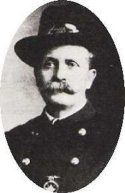This article needs additional citations for verification. (December 2015) |
Bill Tilghman | |
|---|---|
 Tilghman in 1912 | |
| Born | July 4, 1854 Fort Dodge, Iowa, US |
| Died | November 1, 1924 (aged 70) |
| Cause of death | Gunshot wounds |
| Resting place | Oak Park Cemetery in Chandler, Oklahoma 35°42′01″N 96°54′16″W / 35.700278°N 96.904444°W |
| Citizenship | United States |
| Occupation(s) | Buffalo hunter, saloon owner, Deputy U.S. Marshal, Oklahoma state senator, Oklahoma City police chief, film director and actor |
| Years active | 1869–1924 |
| Known for |
|
| Political party | Democratic |
| Spouses |
|
| Children | Charles, Dorothy, William, Vonia, Tench, Richard and Woodrow Tilghman |
William Matthew Tilghman Jr. (July 4, 1854 – November 1, 1924) was a career lawman, gunfighter, and politician in Kansas and Oklahoma during the late 19th century. Tilghman was a Dodge City city marshal in the early 1880s and played a role in the Kansas County Seat Wars. In 1889 he moved to Oklahoma where he acquired several properties during a series of land rushes. While serving as a Deputy U.S. Marshal in Oklahoma, he gained recognition for capturing the notorious outlaw Bill Doolin and helping to track and kill the other members of Doolin's gang, which made him famous as one of Oklahoma's "Three Guardsmen".
Tilghman never achieved the household-word status of his close friends Wyatt Earp and Bat Masterson but nevertheless remains a well-known figure of the American Old West. His memoirs were made into a 1915 film that he directed and starred in as himself.
Tilghman died in 1924 at the age of 70 after being shot by a corrupt prohibition agent on the streets of Cromwell, Oklahoma. Much of the fame that he has since achieved has been attributed to the efforts of his second wife, who published his biography in 1949. In 1960, he was inducted into the Hall of Great Westerners of the National Cowboy & Western Heritage Museum.[1]
- ^ "Hall of Great Westerners". National Cowboy & Western Heritage Museum. Retrieved November 22, 2019.